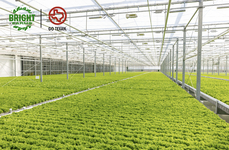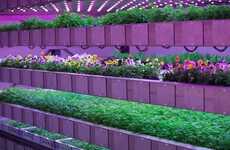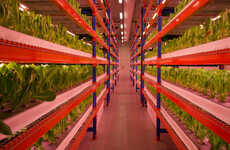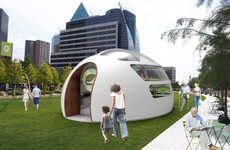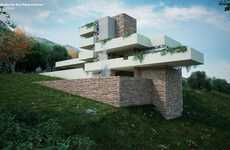
Agrotopia is Designed to Strengthen Urban Food Production
Rooftop greenhouses are becoming more and more popular in urban centers as cities struggle to meet the demands of a growing population. As viable solutions, such initiatives allow residents to eat healthily, as well as—potentially—learn the ins and outs of agriculture.
One rooftop greenhouse is located in the city of Roeselare in Belgium. The facility is designed by Meta Architectuurbureau and Van Bergen Kolpa Architecten. It is officially dubbed Agrotopia and was added to the roof of an existing agricultural market.
Agritopia is designed with two missions in mind. One is to farm food, while the other is to educate the public about agriculture. Spanning a total of 9,500 square meters, the facility was commissioned by REO Veiling and Flemish Farming and Horticulture Research Institute Inagro.
Image Credit: Filip Dujardin
One rooftop greenhouse is located in the city of Roeselare in Belgium. The facility is designed by Meta Architectuurbureau and Van Bergen Kolpa Architecten. It is officially dubbed Agrotopia and was added to the roof of an existing agricultural market.
Agritopia is designed with two missions in mind. One is to farm food, while the other is to educate the public about agriculture. Spanning a total of 9,500 square meters, the facility was commissioned by REO Veiling and Flemish Farming and Horticulture Research Institute Inagro.
Image Credit: Filip Dujardin
Trend Themes
1. Rooftop Greenhouse Farming - The trend of using rooftops for farming and agriculture provides opportunities for companies to develop scalable systems and technologies for efficient production and distribution.
2. Urban Agriculture Education - The trend of incorporating education in urban agriculture initiatives presents opportunities for companies to develop innovative teaching methods and technologies to promote sustainable food production.
3. Sustainable Food Production - The trend of promoting sustainable food production in urban areas presents opportunities for companies to develop eco-friendly and vertical farming systems to meet the growing demand for fresh and healthy produce.
Industry Implications
1. Agriculture Technology - The agriculture tech industry can develop innovative and sustainable solutions such as vertical farms and hydroponic systems to support rooftop greenhouse farming initiatives.
2. Education Technology - The EdTech industry can develop innovative and interactive teaching tools and methods to promote urban agriculture education and awareness.
3. Sustainable Energy - The sustainable energy industry can provide eco-friendly and renewable energy systems to power rooftop greenhouse farms and reduce carbon footprint.
5
Score
Popularity
Activity
Freshness


